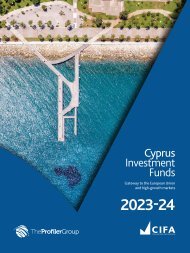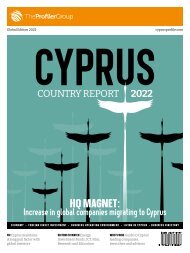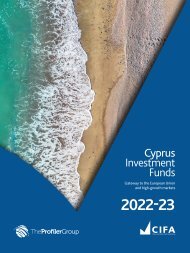2020 Cyprus Country Report
The 2020 Cyprus Country Report features in-depth articles on the economy, foreign direct investment, international trade and headquartering as well as detailed sector profiles and insights from Cyprus’ 100 most influential political, economic and business leaders shaping the future of their country and its industries.
The 2020 Cyprus Country Report features in-depth articles on the economy, foreign direct investment, international trade and headquartering as well as detailed sector profiles and insights from Cyprus’ 100 most influential political, economic and business leaders shaping the future of their country and its industries.
Create successful ePaper yourself
Turn your PDF publications into a flip-book with our unique Google optimized e-Paper software.
Banking<br />
Sector Profile<br />
TOTAL DEPOSITS<br />
€47.9<br />
billion<br />
(August <strong>2020</strong>)<br />
of June <strong>2020</strong>, and the bank has come a long way<br />
since the 2013 financial crisis. Since the 2014<br />
peak, BoC has reduced its stock of non-performing<br />
exposures (NPEs) by €12.4 billion or 83% to<br />
€2.6 billion and its NPE ratio is now reduced to<br />
22% on a pro forma basis, from 30% as of yearend<br />
2019. The lender remains committed to<br />
further de-risking and its capital and liquidity<br />
position remains good and in excess of regulatory<br />
requirements. A considerable boost to BoC’s<br />
balance sheet came in August <strong>2020</strong>, with the sale<br />
of almost €1 billion in NPLs to investment firm<br />
PIMCO. The sale is expected to be completed in<br />
the first half of 2021, and will reduce the bank’s<br />
NPE ratio by five percentage points, a credit positive.<br />
The <strong>Cyprus</strong> Cooperative Bank (CCB) was<br />
one of the top three banks, until the healthy<br />
assets of the state-owned lender were acquired by<br />
Hellenic Bank in June 2018. As part of the deal,<br />
Hellenic Bank (HB) acquired CCBs total deposits<br />
amounting to €9.7 billion and took on €10.3<br />
billion in assets consisting of performing loans,<br />
bonds and cash, and around €500 million in nonperforming<br />
loans. While assets worth approximately<br />
€8.2 billion were transferred to the state,<br />
with the so-called bad assets managed by stateowned<br />
<strong>Cyprus</strong> Asset Management Company<br />
(KEDIPES), which is managed by the <strong>Cyprus</strong><br />
arm of Spanish company Altamira.<br />
The acquisition strengthened Hellenic Bank’s<br />
status as a major player in the market. Following<br />
the 2013 financial crisis, Hellenic Bank was successfully<br />
recapitalised through private funds, and<br />
also led the way in 2017 in becoming the first<br />
financial institution to join forces with an asset<br />
management company, APS Holdings, to manage<br />
its NPLs. The agreement with the Czech debtservicing<br />
specialist, whose clients include Merrill<br />
Lynch, Bank of America, Unicredit, Fortis Bank,<br />
Banco Populari and Deutsche Bank, is of strategic<br />
importance for HB and is part of the group’s<br />
strategy of reorganising and transforming its<br />
business model. APS <strong>Cyprus</strong> currently services a<br />
portfolio of NPLs and real estate assets of around<br />
€2.6 billion that consists of non-performing loan<br />
assets and real estate assets.<br />
RCB Bank has been a solid player in the<br />
<strong>Cyprus</strong> banking landscape for 25 years and<br />
has maintained a very low level of non-performing<br />
exposures and high level of coverage.<br />
Headquartered in Limassol, RCB has sound<br />
capitalisation and good asset quality according<br />
to credit ratings agency S&P, giving the bank a<br />
strong position to weather the macroeconomic<br />
effects of the Covid-19 storm.<br />
With the European Central Bank (ECB)<br />
calling for more consolidation in the EU banking<br />
sector, one <strong>Cyprus</strong> bank in particular has been<br />
making moves in the local market. Consolidation<br />
and strategic new investment came in 2017 with<br />
a group of international investors led by Lebanese<br />
banker Maurice Sehnaoui acquiring the majority<br />
stake of the <strong>Cyprus</strong> subsidiary of Greece’s largest<br />
lender Piraeus Bank. Now rebranded AstroBank,<br />
the lender, who cites growth as a top priority in its<br />
strategy, has taken bold steps to expand its opera-<br />
Sector Structure and Regulation<br />
The key<br />
opportunity is<br />
our country's<br />
transition<br />
to the era of<br />
the fourth<br />
industrial revolution. The<br />
digital revolution is no longer<br />
an abstraction. Bank of <strong>Cyprus</strong><br />
is constantly upgrading and<br />
expanding its range of digital<br />
products and services and<br />
cultivating digital culture<br />
among its staff and customers.<br />
Our actions come under of the<br />
philosophy “CYON” (<strong>Cyprus</strong> On)<br />
and go beyond banking. Beyond<br />
Banking is about services and<br />
products that traditionally<br />
were not associated with<br />
the industry however recent<br />
technological innovations open<br />
up a variety of opportunities<br />
through Digital Channels.<br />
Panicos Nicolaou<br />
CEO<br />
Bank of <strong>Cyprus</strong><br />
<strong>Cyprus</strong>’ banking sector is comprised of two tiers: domestically-oriented banks<br />
and international banks. International banks have long been attracted to the<br />
island for its fiscal regime and to use the country as a launch pad into high-growth<br />
and emerging markets. The list of banks of foreign origin in <strong>Cyprus</strong> consists<br />
of over 30 institutions, which mainly carry out international banking business<br />
and have limited interaction with the domestic economy. Beyond the traditional<br />
deposit and lending services to households, corporations and SMEs, banks in<br />
<strong>Cyprus</strong> operate under the ‘universal banking model’ and offer a diverse range of<br />
products and services. Deposits from customers have traditionally been the main<br />
source of funding for banks. Banking in <strong>Cyprus</strong> is regulated by the Central Bank<br />
of <strong>Cyprus</strong> and is fully harmonised with EU legislation and directives. Changes<br />
introduced by the EU’s Single Supervisory Mechanism (SSM) saw the transfer<br />
of supervision of all the eurozone’s largest banks to the European Central<br />
Bank (ECB) in 2014, harmonising the landscape for all big banks in Europe.<br />
58 <strong>Country</strong> <strong>Report</strong> CYPRUS <strong>2020</strong>

















